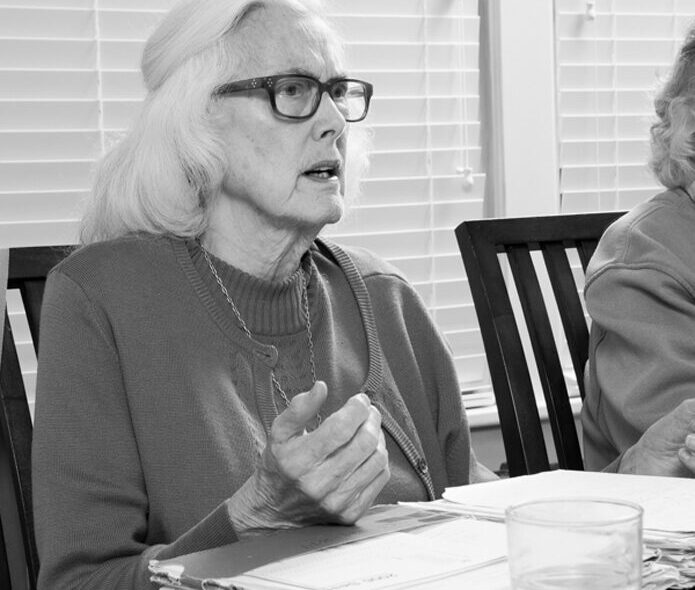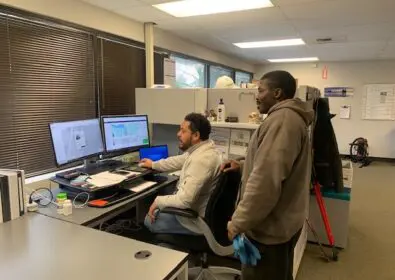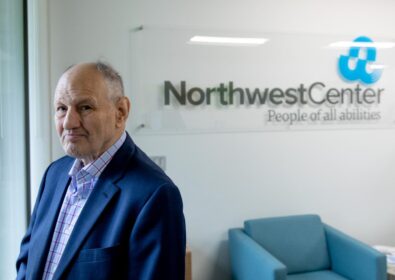It’s been more than 50 years since Cecile Lindquist first served as president of the Northwest Center Board of Directors. But she’s just as likely today to press a flier about a proposed education bill into your hand, ask you to contact your elected officials, and work with local parents of kids with developmental disabilities.
In the early 1960s, Lindquist was a high school teacher with degrees in political science and education. She helped found what would later become Northwest Center when her cousin Tommy, who had Down syndrome, was rejected by Seattle public schools.
She went on to serve on the team that wrote and lobbied to pass House Bill 90 (HB 90), Education for All, the first law in the nation mandating public education for all children regardless of disability. By the time HB 90 passed, Tommy was too old to benefit. But Lindquist went on to spend the next five decades helping make education available for countless other kids like him.
ot long after Northwest Center was founded in 1965, Lindquist took a job with the Experimental Education Unit (EEU) of the University of Washington, a school for children with and without disabilities, working both in admissions and as community relations manager – “Which I loved,” she says now. In fact, Lindquist loved the job so much she stayed there for more than 30 years. Her boss there was the founder of EEU, Norris Haring, PhD, who proved to be exceptionally understanding when Lindquist needed to juggle work duties with the time she was devoting to writing and lobbying to pass HB 90.
“I said, ‘Dr. Haring, I don’t know what to do because I’m going to work with a lot of mothers and fathers; we’re going to change the law,’” she remembers. “‘What if I have to leave for a meeting?’ He said, ‘Just go to the meeting. This is all part of the same thing, providing what is needed for these children.’”
When HB 90 was signed into law in 1971, Lindquist was the only woman from the original team who wrote the bill to be asked to serve on the rules and regulations committee. She was not pleased by this, to put it mildly. She and Janet Taggart, who also worked on the bill, recount the story:
“We get the law passed, and that was really a big accomplishment,” Lindquist begins. “The State Superintendent of Schools set up a committee to write the rules and regulations, every bill has to have one. And honest to God, they only put Bill Dussault [a law student who also helped write HB 90] and me on it!”
“Not wanting the rest of us,” says Taggart.
“I just erupted,” Lindquist says. “I called the State Superintendent of Schools, who I didn’t know very well, you know? I said, ‘This is just outrageous, because this fight and this crusade came from the parents! They have to be on this, writing the regulatory language!’”
At first, the rules committee wouldn’t budge. “At the first meeting, there were enough chairs for all the committee members, but not us,” Taggart recalls. “They said they were ‘Really sorry,’ but they didn’t have any chairs. So we sat on the floor,” she shrugs.
“But we made a big enough stink that they eventually put everyone on the committee,” Lindquist says.
More Coverage for More Kids
It took two years for HB90 to be implemented statewide. By that time, Lindquist was on to her next challenge. HB 90 mandated that public schools serve children of any ability from age 5 to 21; she set out to get the starting age lowered to 3.
“I had heard from parents who said, ‘My little guy got in at 5, but he lost so much time, waiting to get to that age,’ or, ‘It’s great what you did, but my younger child is ready to get help, and there isn’t any.’ I knew how critical it was to lower the age, because by then I was working at the EEU and saw how important those early years are. So I said, ‘Well, we’re just gonna have to put together a team of new families.’”
Lindquist started “a coalition of young moms and who had little guys. They were a feisty group,” she says. “It took us ’til ’84 to get this law passed, just changing the age range so that all children with disabilities, 3 to 21, would be served.”
The years it took were challenging for Lindquist. “We kept working and working and working, and finally I talked to a Republican Senior Senator from Bellevue, Dan MacDonald. I said, ‘Dan, I don’t understand. It didn’t take us very long to get the bill passed for 5 to 21.’
“He just looked at me and said, ‘Cecile, they’ve caught up with you. They’ve realized when you guys start to push something, it’s gonna be a big cost to the State.’ Ha! I was quiet and then I said, ‘But Dan, I know you know it’s the right thing to do.’ He was one of the Republicans who stuck with us on HB 90. It wasn’t too long until he told me, ‘I’m gonna help you.’ He made the difference to push it through.”
Senator Barney Goltz made a big difference, too. It was 1984, and Lindquist was in Olympia, trying for the fourth year in a row to get the State Senate to pass the bill. “Barney Goltz was running the Senate. It was the last day. The time is ticking away and we’re all sitting in the gallery, and I’m wondering how I’m going to keep the parent group active. Finally, I stood up and I went like this (she makes a pleading, desperate face) to Barney. He said, ‘Oh!’ Then he pounded the gavel and said, ‘We were going to hear the bill on school for children starting at age 3. I don’t care how late we’re here; we will discuss this.’ And that bill passed after-hours.”
Another decade of working with children with developmental disabilities, and Lindquist knew the next logical step: that intervention and education should start at birth. “That was the next project,” she says with typical matter-of-fact delivery. She joined up with another group of mothers led by Cassie Johnston (“Just a wonderful, warm person who was able to connect with people around the state”). Though organizations like Northwest Center had provided early intervention to children from birth since the 1980s, the state law mandating such services wasn’t passed until 2006.
Lindquist is now retired, but still an active advocate for families of children with developmental disabilities. In 2010, she worked on a bill that ensured that services for children with disabilities would come not from the Department of Social and Health Services, but from the Department of Early Learning. “Those people are the early childhood experts,” she says. Just this past spring, another group of families enlisted her help in lobbying the state legislature for additional funding to help identify disabilities and delays in infants.
“For me, it’s the fairness, it’s the equity,” she says of her work. “Ensuring that a child with a disability has absolutely the same rights as any other child. They’re all children. They all need to have the best possible opportunity to use their own skills.”



